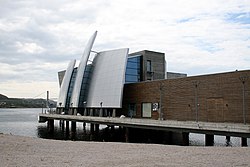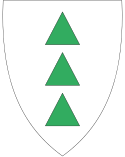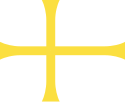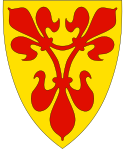Nord-Trøndelag fylke
| Nord-Trøndelag fylke | |||
| Nord-Trøndelag | |||
| Fylke | |||
| |||
| Land | |||
|---|---|---|---|
| Koordinater | 64°30′N 11°40′Ö / 64.500°N 11.667°Ö | ||
| Residensstad | Steinkjer | ||
| Area | 22 415 km² | ||
| Folkmängd | 136 399 (2016)[1] | ||
| Befolkningstäthet | 6 invånare/km² | ||
| Grundad | |||
| Upphört | 31 december 2017 | ||
| - Uppgått i | Trøndelag fylke | ||
| Ledare | |||
| - Fylkesordförande | Pål Sæther Eiden (2015–) (H) | ||
| - Statsförvaltare | Inge Ryan | ||
| Tidszon | CET (UTC+1) | ||
| - sommartid | CEST (UTC+2) | ||
| ISO 3166-2 | NO-17 | ||
| Geonames | 3144148 | ||
Fylkets läge i Norge | |||
| Wikimedia Commons: Nord-Trøndelag | |||
| Redigera Wikidata | |||


Nord-Trøndelag fylke var ett tidigare fylke (län) i Norge som gränsade till Norska havet, Nordland fylke och dåvarande Sør-Trøndelag fylke samt Jämtlands län i Sverige. Före 1 januari 1919 hette området Nordre Trondhjems amt. Gamla Trondhjems amt bildades 1662 och delades den 24 september 1804. [2] Residensstad var Steinkjer.
Den 1 januari 2018 slogs fylket samman med Sør-Trøndelag fylke för att tillsammans bilda Trøndelag fylke.[3]
- Area: 22 396 km²
- Befolkning: 130 192 invånare (2008.1.7)
Kultur
Kystkultursenteret Norveg i Rørvik i Vikna kommun var Nord-Trøndelags tusenårssted.
Kommuner i Nord-Trøndelag fylke
- Flatangers kommun
- Fosnes kommun
- Frosta kommun
- Grongs kommun
- Høylandets kommun
- Inderøy kommun
- Leka kommun
- Leksviks kommun
- Levangers kommun
- Lierne kommun
- Meråkers kommun
- Namdalseids kommun
- Namsos kommun
- Namsskogans kommun
- Nærøy kommun
- Overhalla kommun
- Røyrviks kommun
- Snåsa kommun
- Steinkjers kommun
- Stjørdals kommun
- Verdals kommun
- Verrans kommun
- Vikna kommun
Fylkets tätorter kommunvis
|
|
Se även
Referenser
- ^ Population and population changes, 1 January 2016 (på engelska), läs online, läst: 1 juni 2016.[källa från Wikidata]
- ^ World Statesmen (läst 2 april 2011)
- ^ https://www.regjeringen.no/no/tema/kommuner-og-regioner/kommunereform/Hvorfor-kommunereform/vedtatte-sammenslainger/id2470015/
| ||||||||||
| ||||||||||
Media som används på denna webbplats
Författare/Upphovsman: Gutten på Hemsen, Licens: CC0
Flag of Norway with colors from the previous version on Commons. This file is used to discuss the colors of the Norwegian flag.
Coat of arms for the municipality of Grong (kommune), Norway The arms show three triangles of spruce trees (gran), making the arms canting. The name is supposedly derived from Granungar. The number three symbolizes the three villages in the municipality: Harran, Bergsmo, and Mediå.
Coat of arms for Nord-Trøndelag; until 31 December 2017 county (fylke), Norway
Coat of arms for the municipality of Namdalseid (kommune), Norway 8 December 1989. The arms show green and white clover leaf shapes which represent the history of agriculture in the municipality.
Coat of arms for the municipality of Snåsa (kommune), Norway
Trondheimsfjorden seen towards eastnortheast from a hillside in Mosvik, Skogn and Levanger in sight
Coat of arms for the municipality of Verdal (kommune), Norway
Coat of arms for the municipality of Høylandet (kommune), Norway The arms show a gray Whooper Swan (Cygnus cygnus) on a green background
Coat of arms for the municipality of Vikna (kommune), Norway The coat-of-arms is from modern times. They were granted on 13 May 1988. The arms show three salmon on a blue background. This was chosen because salmon fishing and farming was (and still is) an important source of income in the municipality.
Kystkultursenteret Norveg, Rørvik, Nord-Trøndelag. Arkitekt: Gudmundur Jonsson
Författare/Upphovsman: PNG flag by AlexR.L. (CC-BY-SA 3.0)
Coat of arms by SKvalen (PD-Norwegian CoA)
SVG flag by SiBr4, Licens: CC BY-SA 3.0
Flag of Nord-Trøndelag County, Norway.
Logtun church, Frosta, Nord-Trøndelag, Norway.
Coat of arms for the municipality of Verran (kommune), Norway The coat-of-arms is from modern times. It was granted on 11 September 1987. The arms show blue with a silver verranjekt, a type of boat that is common in the area.
Coat of arms for the municipality of Lierne (kommune), Norway The arms show three Lagopus lagopus (willow grouse). The birds are plentiful in the area and hunting them was of great importance historically for the inhabitants to survive during the winters in the area. The bird was thus chosen as a symbol for the municipality.
Coat of arms for the municipality of Fosnes (kommune), Norway The arms show a black oarlock from a rowing boat on a yellow background. Fosnes is a coastal municipality and rowing boats were the main form of transportation in the former centuries.
Coat of arms for the municipality of Flatanger (kommune), Norway. The arms show three chevrons which represent the front of a boat.
Coat of arms for the municipality of Stjørdal (kommune), Norway
Coat of arms for the municipality of Overhalla (kommune), Norway The coat-of-arms is from 1989, but is inspired by an old seal for the district by King Håkon Magnusson from 1344. It shows seven red greek crosses arranged in a circle on a gold background
Coat of arms for the municipality of Røyrvik (kommune), Norway The arms show a typical cross design which is a common decoration on the pottery and other hand-made articles found in the area. The objects were made by the ancestors of the Sami people living in the area. The crosses probably indicate the four points of the compass.
Coat of arms for the municipality of Leksvik (kommune), Norway The arms show the blue Trondheimsfjorden and a silver part representing the land with a clover at the end of it to represent life and growth.
Författare/Upphovsman: Marmelad, Licens: CC BY-SA 2.5
Autogenerated locator map of norwegian county as named in filename.
Coat of arms for the municipality of Inderøy (kommune), Norway The coat-of-arms is from modern times. They were granted on 5 October 1984. The arms show four European plaice on a red background. This fish was once plentiful and was one of the main sources of income for the area until around 1940.
Coat of arms for the municipality of Levanger (kommune), Norway. The coat-of-arms is from modern times. They were granted on 25 November 1960 as the arms of the town of Levanger. The horse is a symbol for the town as a major trading center between Sweden and Norway for many centuries. The arms did not change after the addition of the other municipalities (that had no arms when they were merged with Levanger)
Coat of arms for the municipality of Namsos (kommune), Norway: Gules a moose head couped horns displayed Or. The coat-of-arms was granted on 5 May 1961. The arms show a golden moose on a red background. The moose was chosen as a symbol for the municipality, since Namsos is the capital of the forest-rich Namdalen region, and the moose is the "king of the forest". The arms are an excellent example of the mid-twentieth century artistic style of the herald Hallvard Trætteberg. The moose head is drawn with horns displayed rather than in natural position to make the head fill the shield surface as much as possible.
Coat of arms for the municipality of Meråker (kommune), Norway Traditionally, mining has played a major role in the area and has been of great economic importance for Meråker. The mining cart as a symbol for the municipality was thus an obvious decision. The cart depicted in the arms, however, is officially described as a cart, not a mining cart.
Coat of arms for the municipality of Namsskogan (kommune), Norway The coat-of-arms is from modern times. They were granted on 21 December 1984. The arms show a gold moose's antler on a black background. The municipality is heavily forested and many moose can be found in the area. The arms are based on a very large antler, with a rare golden color, which hangs on the community hall.
Coat of arms for the municipality of Steinkjer (kommune), Norway
Coat of arms for the municipality of Nærøy (kommune), Norway The coat-of-arms is from modern times. They were granted on 22 May 1987. The arms are based on the seal of King Håkon Magnusson from 1344, on a document in which the King granted several rights to the local farmers. The seal shows the St. Mary in a portal decorated with fleur-de-lis, the symbol of the St. Mary. The arms show a combination of three fleur-de-lis, the colour was chosen as red, as the local water lilies generally have a red color.
Coat of arms for the municipality of Leka (kommune), Norway The arms show the golden wing and claw of an eagle on a red background. (In 1932 a child was taken by an eagle on the island.)
Coat of arms for the municipality of Frosta (kommune), Norway


































